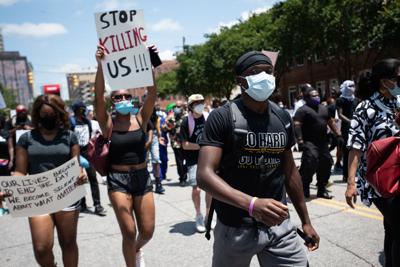The growth of a person, and of a culture, are both marked by watershed moments.
Yours may be different, but for me, my moments seem to be centered around the realizations that come with new experiences. Like teaching my first classes at the University of South Carolina and realizing that people were writing down what I said, so I owed those people my responsibility. I had to be the grownup in the room.
About that same time, I had my two children and experienced the very radicalizing sensation that the words, “I would die for you,” were more than cliché. It’s a heavy thing to be in one’s 20s, living that happy-go-lucky, wonder-what-the-meaning-of-my-life-is existence and suddenly realize that, “Oh, it’s definitely doing whatever one can to ensure the health and happiness of these little people over here.”
Both were watershed moments, and there have been more. Moments when we experience the clarity that everything one has done up until that moment in time has brought us to where we are and our worlds, as we know them, will never be the same. It’s one of the most profound ways we grow as individuals.
Cultures grow, too. And by culture, I mean both the collected manifestations of human intellectual achievement within given parameters, as well as something intangible about a people. The spirit of a people sounds lofty, but it may be the most appropriate word.
As a person of, ahem, some age, I’ve had the pleasure of experiencing what I thought were watershed moments in America’s cultural history. Some, like Stonewall and #MeToo really have been defining moments and, whether or not they took us all the way to where we need to be, in terms of gay rights and women not having to have sex with their bosses to get the opportunities to advance in their careers, these moments took American culture further than it had ever been before.
They grew us.
Other potential times of great social change fizzled out, only taking us a few steps forward. For example, the misogyny inherent in the mythology of original sin will circumvent gender equality until we accept the disquietude of science over the comfort of myth. No wave of the women’s movement has yet tackled patriarchal folklore effectively.
For those of us who put our worlds together as we were growing up in the ’60s and ’70s, a changing, growing culture was part of life. Protests and demonstrations for a better world were de rigueur, and I engaged in acts of civil disobedience vicariously until I was old enough to pick up a picket sign myself. I assumed that was the way it was supposed to be.
Then came Reagan.
I still clearly remember the naivety of my shock that some people didn’t want to grow. Not intellectually. Not culturally. To be honest, while I pity the fear and greed that informs an unwillingness to evolve as a person and a culture, I don’t get it. I don’t understand how even privileged people fail to see the advantages of altruism or, at least, cooperation.
Philosophically, I’ve always, at my core, been a Hegelian. If you remember, the German idealist Hegel taught us the concept of the dialectic. Simply put, we have an idea about something — a thesis. That thesis is challenged by a new idea that refutes or negates it — an antithesis. These two, the thesis and the antithesis, get together and knock it out and what emerges is a synthesis — a resolution of the conflict between the two that advances our thoughts and actions and creates progress.
Growth.
Undeniably, this is where we are right now as a culture, and where many of us are as individuals, as we integrate the abundance of insight and wisdom delivered to us via the Black Lives Matter movement.
No, it isn’t easy. Culturally, we must accept that the synthesis of our conflict will require massive changes. It’s time to take seriously talks about reparations, free tuition for our BIPOC youth, reduced mortgage rates for our BIPOC neighbors, and fully funded national and statewide offices of reconciliation and justice and apply our brightest minds to these tasks.
On an individual level, white people must employ our own unique blends of vulnerability, guilt or shame, intellect, and forgiveness to progress. We can help each other by sharing insightful information, talking within and across skin color and the other labels that divide us, and by being less critical of the ways we try to do the right thing and sometimes do them the wrong way.
This needs to be a watershed moment in the life of our culture and the lives of our people. We have to make it count.









